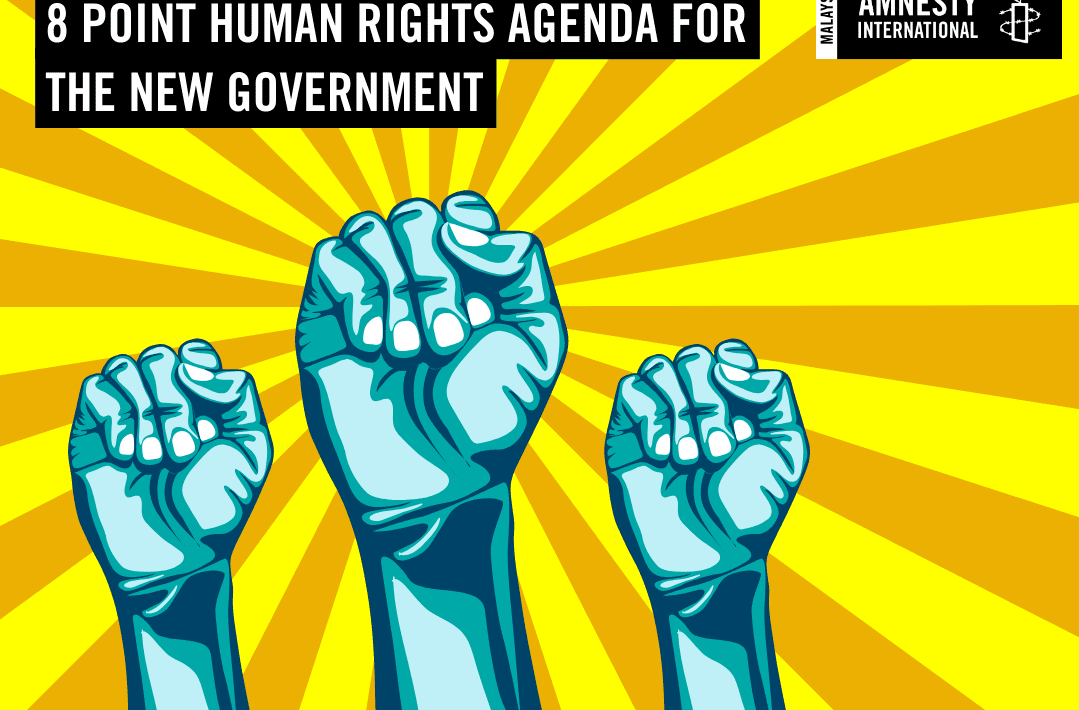Malaysia’s new government must put human rights at the heart of its policies and reverse repressive actions that have tarnished the start of the Perikatan Nasional administration.
Prime Minister Tan Sri Muhyiddin Yassin must affirm the government’s commitment to respecting, protecting, and promoting human rights and introduce human rights reforms Malaysians have been calling for.
In this spirit, Amnesty International is releasing an 8 Point Human Rights Agenda for the new government, detailing priority areas of human rights to focus on, along with recommendations to implement these reforms. Preethi Bhardwaj, Interim Executive Director of Amnesty International Malaysia said:
“There might have been a change at the top of government, but Malaysia should always strive towards progress in human rights regardless of who is in power. We urge the Perikatan Nasional administration to enact legislation and craft policies that will respect the rights of all people and contribute to a better Malaysia for everyone.
“The key areas we call on the government to address include:
- protecting the rights to freedom of expression and freedom of peaceful assembly;
- working towards the abolition of the death penalty;
- establishing the Independent Police Complaints and Misconduct Commission (IPCMC);
- ensuring the protection of minorities, including refugees, LGBTI individuals and indigenous peoples and;
- respecting freedom of religion.”
A rocky start
The Perikatan Nasional government has not yet reassured the country that it will protect the rights of everyone.
Shortly after Muhyiddin was appointed Prime Minster, peaceful protests broke out against the manner in which the new government was formed. Police called protesters in for questioning, in violation of the right to peaceful assembly.
As cases of COVID-19 began to increase in March, so too did the number of human rights violations. Despite the Immigration Department’s promise that raids would not be conducted during the implementation of the Movement Control Order (MCO), raids took place in areas heavily populated by migrants and refugees such as Selayang, Masjid Jamek, and Petaling Jaya Old Town, leading to mass arrests of men, women, and children. Moreover, some boats carrying Rohingya refugees have been turned away, while others allowed to dock have led to the mass detention of all aboard.
“The first few months of Perikatan Nasional’s administration did nothing to assuage concerns regarding the state of human rights in Malaysia. The government has denied the rights to freedom of expression and peaceful assembly through the use of repressive laws such as the Communications and Multimedia Act and the Sedition Act to silence peaceful dissent. Undocumented migrants and refugees have faced persecution at the hands of the authorities and put at direct risk of becoming infected with COVID-19, in violation of their right to health.
An agenda for action
In its Human Rights Agenda for the new government, Amnesty International calls on all parties, Ministers and Members of Parliament to respect, protect, fulfil and promote human rights for all, and publicly commit to meet and expand Malaysia’s international human rights obligations.
“The July parliamentary sitting is a chance for the government to turn its worrying approach towards human rights around. Our Agenda sets out concrete recommendations, which, if implemented, would improve the situation in Malaysia. The government should reconsider human rights reforms stalled by political developments and COVID-19, most notably in amending repressive laws, setting up the Independent Police Complaints and Misconduct Commission, and taking steps to abolish the death penalty.
We call on the government to engage with civil society to continue human rights reform in Malaysia. We stand ready to work with them and with the government on the recommendations set out in our Agenda,” concluded Bhardwaj.
Background
Prime Minister, Tan Sri Dato Muhyiddin Yassin was appointed by the King on 29 February 2020 following days of political uncertainty after the previous Prime Minister, Tun Dr Mahathir Mohamad, resigned from the post.
Since the change in government, human rights in Malaysia have come under attack. In particular, the government has failed to respect and protect the rights to freedom of expression and peaceful assembly. Refugees and migrant workers and Indigenous peoples’ have also experienced violations of their rights. One of the top items of the new government’s plan should be to commit to the respect of human rights in Malaysia and act on pressing concerns, including those in this agenda.


